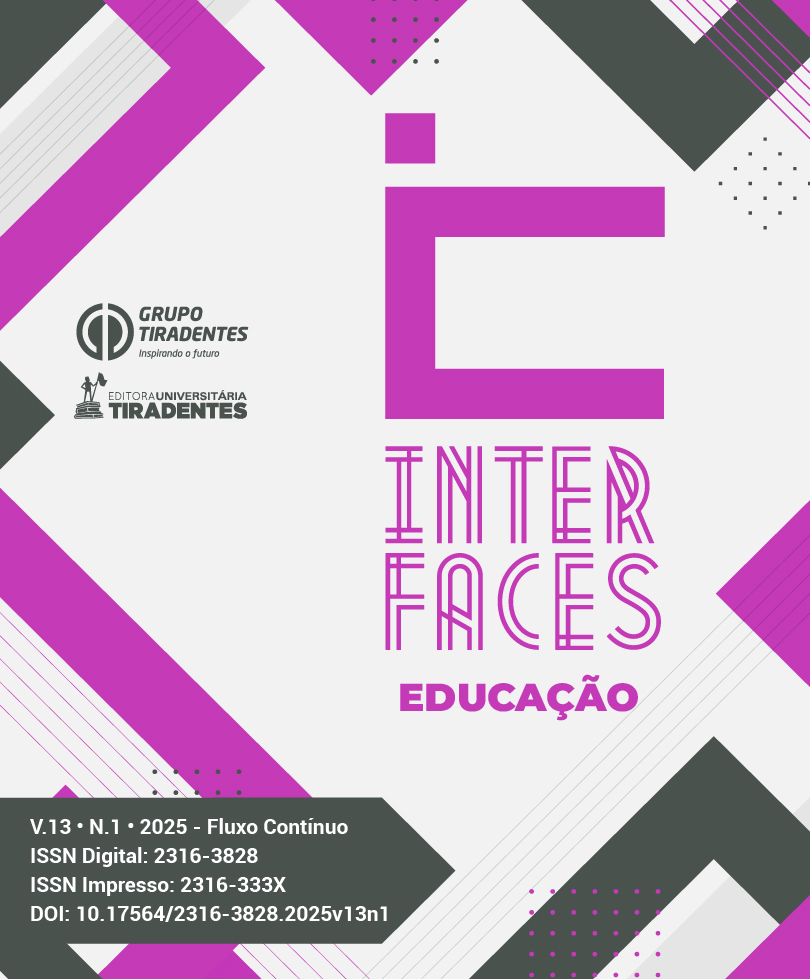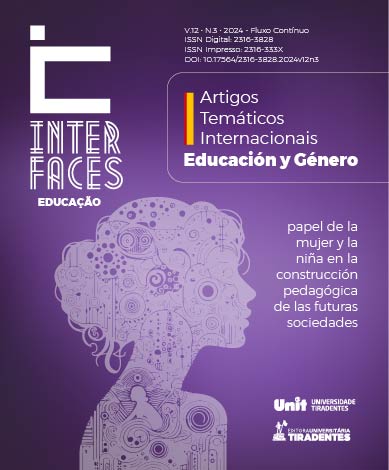SILENCING AND DISCURSIVE REPRESENTATIONS OF SUBJECTS WITH MENTAL DISORDERS IN THE ENEM 2020 MOTIVATING TEXT: A DIALOGICAL ANALYSIS
DOI:
https://doi.org/10.17564/2316-3828.2025v13n1p30-43Keywords:
Silenciamento, Representações Discursivas, Identidade SocialPublished
Downloads
Downloads
Issue
Section
License
Copyright (c) 2025 Interfaces Científicas - Educação

This work is licensed under a Creative Commons Attribution-NonCommercial 4.0 International License.
A Revista oferece acesso livre e imediato ao seu conteúdo, seguindo o princípio de que disponibilizar gratuitamente o conhecimento científico contribui para a democratização do saber. Assume-se que, ao submeter um artigo, o(a) autor(a) se reconhece como detentor(a) do direito autoral sobre ele e autoriza seu livre uso pelos leitores, podendo ser, além de lido, baixado, copiado, distribuído e impresso.Abstract
In this study, we examine the dialogic-discursive movement that leads to the silencing of individuals with mental disorders, focusing on Motivating Text 1 of the Enem 2020 essay, in its first application. We used Dialogical Discourse Analysis (DDA) to understand how implicit discursive representations contribute to this silencing. Based on the definitions of “silence” by Mikhail Bakhtin (2017) and Michel Pollak (1989), we broadened the discussion to the concept of silencing, understood as an imposition of oppressive forces in social relations. The results showed that these discursive representations promote the silencing of people with mental disorders by highlighting: a) mental health as emotional balance, focusing on “mentally healthy people”, b) the universalization of psychological suffering, generalizing experiences, and c) the emphasis on help and support, underlining the individual's ability to overcome. These representations contribute to a silencing that reinforces stereotypes and prejudices, damaging the construction of the social identity of these individuals.
How to Cite
References
BAKHTIN, Mikhail M. Fragmentos dos anos 1970-1971. In: BAKHTIN, Mikhail M. Notas sobre literatura, cultura e ciências humanas. Organização, tradução, posfácio e notas de Paulo Bezerra. Notas da edição russa Serguei Botcharov. São Paulo: Editora 34. 2017, p. 21-56.
BAKHTIN, Mikhail M. Questões de literatura e estética: a teoria do romance. 5. ed. Tradução: Aurora Fornoni Bernardini et al. São Paulo: Editora Hucitec e Annablume. 2002.
BECHARA, Evanildo. Dicionário da Língua Portuguesa Evanildo Bechara. Rio de Janeiro: Nova Fronteira, 2011.
BRAIT, Beth. Bakhtin: outros conceitos chave. 2. ed. São Paulo: Contexto, 2016.
BRASIL. Instituto Nacional de Estudos e Pesquisas Educacionais Anísio Teixeira. Provas e gabaritos: Exame Nacional do Ensino Médio 2020. Brasília: INEP, 2020. Disponível em: https://download.inep.gov.br/enem/provas_e_gabaritos/2020_PV_impresso_D1_CD1.pdf. Acesso em: 30 ago. 2024.
BRASIL. Instituto Nacional de Estudos e Pesquisas Educacionais Anísio Teixeira (Inep). A redação no Enem 2022: cartilha do participante. Brasília, 2022. Disponível em: https://download.inep.gov.br/download/enem/cartilha_do_participante_enem_2022.pdf. Acesso em: 10 de jul. 2024.
LAMPOGLIA, Francis; MIOTELLO, Valdemir. O silêncio e o calar sobre a ditadura militar pelo olhar de Bakhtin: a diferença entre o ouvir e o escutar. Palimpsesto – Revista do Programa de Pós-Graduação em Letras da UERJ, Rio de Janeiro, v. 11, n.14, p. 1-14, 2012. Disponível em: https://www.e-publicacoes.uerj.br/palimpsesto/article/view/35248. Acesso em: 21 jul. 2024.
POLLACK, Michael. Memória, esquecimento, silêncio. Tradução do francês de Dora Rocha Flaksman. Estudos Históricos, Rio de Janeiro, v. 2, n. 3, p. 3-15, 1989. Disponível em: http://www.cpdoc.fgv.br/revista/arq/43.pdf. Acesso em: 20 jul. 2024.
PONZIO, Augusto. Ecritura de la novella y del cinema como crítica de La comunicación global. Revista Signa, n. 15, 2006. Disponível em: https://www.cervantesvirtual.com/obra/escritura-de-la-novela-y-del-cinema-como-crtica-de-la-comunicacin-global-0/. Acesso em: 20 jul. 2024.
PONZIO, Augusto. El juego del comunicar. Entre literatura y filosofia. Valencia: Episteme, 1995.


















